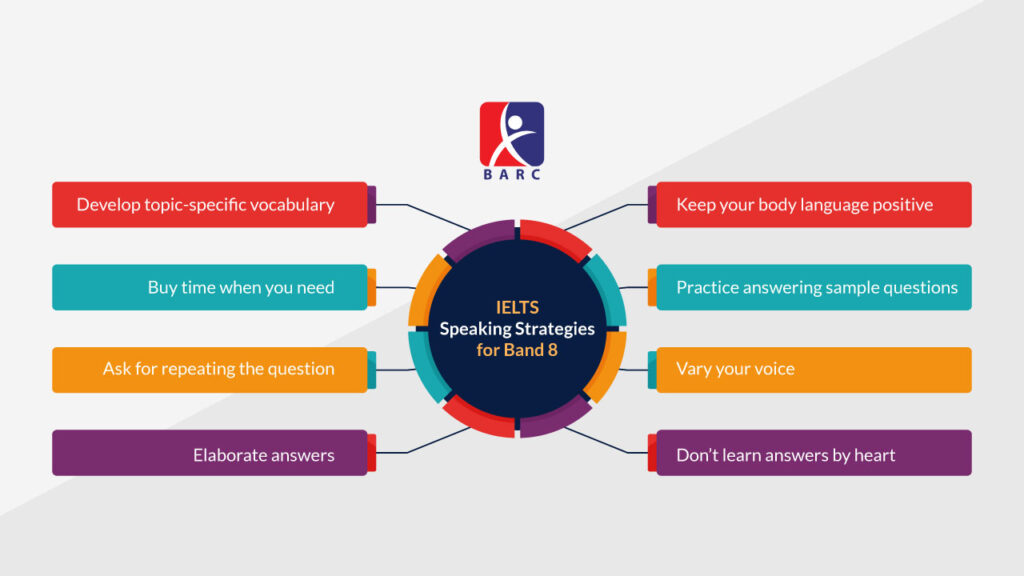
IELTS Speaking Strategies for Band 8
Even though only a handful of candidates can manage to score a Band 8, this is certainly achievable. All you have to do is execute well throughout the exam. What will you apply? There comes the need for tips and tactics. Of course, regular and rigorous practice are keys to obtaining the maximum output in Speaking. But attaining a band 8 necessitates strategies beyond basic speaking skills. Let’s delve into the IELTS speaking strategies for band 8.
1. Keep your body language positive
Confidence is the key to acing the speaking test. If it is so, your body language is the reflection of that confidence. The question arises of what to do and how to do it. The first thing you can do is sit with a relaxed posture once you enter the room at the start of the exam. Everyone has a different sitting style and sits the way you feel most comfortable. What’s more, using hand gestures while speaking is even more significant to keep your confidence high throughout the exam. Do it spontaneously, not forcefully. Do it as if you’re enjoying the conversation to the core. Only then, your hand gestures will produce automatically.
2. Practice answering sample questions when prepping for the test
Why is it vital to practice answering sample questions before the test? It does multiple jobs for you. On the one hand, it will develop your fluency unprecedentedly as you’ll confront a series of past exam questions. That you are covering a lot of content will give you a boost in your fluency. Speaking is like a knife; the more you speak, the better your fluency will be. On the other hand, your idea-generation sense will expand to a large extent.
Maybe, you would never have thought of a question like ‘Why do people go fishing?’ but are provided with one like this. What this situation can bring to the table is it can drag your confidence down, which will be resulted from the content-related hesitation. The bottom line is when you practice at home with somebody else in your examiner’s shoes, this will not only improve your fluency but also familiarize you with a galaxy of situations that you will be facing in the real exam.
3. Vary your voice
According to Infoplease, there are over 7100 languages in the world. Each of them has distinctive features. In terms of English languages, you may have noticed that it is a language full of variations and diversities, unlike Bengali. If you have watched an English movie or the news on BBC or CNN, you will notice that the way they speak is not flat at all.
Instead, they vary their tone speaking with high tones and low tones in between their conversations. Why is that? That’s the beauty of English and that’s what the English language is like. So in some sentences, your tone will rise and in other sentences, your tone will go down. That’s how English is spoken.
Hence, as long as you speak with a single tone and a flat tone throughout the exam, that will presumably not earn you a band 8 even though your fluency and accuracy are to the point. What can you do to progress in this regard? You may grow a habit of listening to your favorite podcast and news channels. The more you listen, the nicer speaker you’re likely to be. This aspect of speaking is often overlooked by thousands of candidates and teachers alike but is an indispensable part of gaining a high band in IELTS speaking.

4. Don’t learn answers by heart
This is probably the most devastating mistake IELTS candidates do in speaking. A lot of people have miraculous memorization power. Though it is good sometimes in other tests in the academic arena, IELTS has nothing to do with memorization power.
It’s a skill-based test and a test of language proficiency. It evaluates you based on your instant language level. You might be thinking that some memorized answers will bring you a super amazing score and that you’ll be capable of hiding the fact that you’ve memorized the answers.
Nevertheless, examiners can sense it if you speak from your memorization because they are used to assessing hundreds of candidates each month. And their experience will reveal it all to them. So, the best way to approach the exam is to demonstrate your ability to speak fluently, accurately, and smoothly. If you are mindful of developing your pronunciations, coherence, synonyms, fluency, and grammatical range, this will reach the apex of success in IELTS Speaking. By memorization, you will not be able to go a long way.
5. Develop topic-specific vocabulary
You might be aware of the fact that lexical resource accounts for 25% of the total mark in the speaking exam. As the IELTS band descriptor suggests, you need to use a wide range of vocabulary resources readily and flexibly to convey precise meaning. Apart from it, you have to use less common and idiomatic vocabulary skillfully. Interestingly, you can still achieve a band 8 with occasional inaccuracies. And you have to use paraphrase effectively. Having said this, your synonymous knowledge of vocabulary plays a crucial role as well. Let us look at how paraphrasing works.
Example:
Question: What are your favorite means of communication?
Paraphrased answer: I am fond of trains when it comes to commuting to remote places. The reason why I find it interesting is the way I feel during the travel. It’s way less exhausting and more enjoyable when compared to buses. Moreover, I have no chance of getting stuck in traffic congestion whatsoever if I pick trains as a travel companion. Analysis: The word ‘favorite’ in question is paraphrased by ‘fond of’ in the answer. The phrase ‘means of communication’ is paraphrased into ‘commuting to remote places’ and ‘as a travel companion’ in the answer.
While this is one of the ways to demonstrate your ability, you also need to be vigilant about incorporating topic-specific vocabulary in order to get a band 8. How does that work? Let’s understand the concept through the example below.
Example:
Question: Describe your best friend.
- Discuss who the person is
- What was the situation of your meeting?
- And what do you like about him/her?
Answer: My best friend is Abdullah Al Fahad and I got to know him when I started my bachelor’s at East-West University. We studied in the same department. We had a lot in common, so soon after we started bachelor’s, we started to enjoy each other’s company.
With time, lots of my school friends drifted apart, but I have been able to keep in touch with him and I feel like he is my lifelong friend. When we arrange a dinner date, we share a lot of interesting things with each other. Most importantly, we share a common background. He is a shoulder to cry on. He always steps up through my thick and thin.
Analysis: If you look at the sample answer, you would see that there are seven phrases marked in bold and they are closely related to the central topic ‘friend’.
NB: Drift apart = To become less close to someone.
Enjoy each other’s company = To like spending time with each other.
Keep in touch = To contact each other.
Lifelong friend = A friend you have had for most of your life.
A common background = To share a similar heritage or culture.
A shoulder to cry on = A person to share your sorrows or sympathize with you.
Through thick and thin = In good and bad times.
6. Buy time when you need time to think
During the test, many candidates become indecisive about the situation or by any unexpected questions. This indecisiveness derives from the confusion in understanding any question or being least adoptive. No matter what the reason is, you will get back on track if you buy some time technically you are suffering from a content-related hesitation, you may buy time using the phrases below.
- I have not thought about it before, but from my experience, I can tell that
- If I am not mistaken, I would state that
- I am not quite sure about it, let me think ….
- That’s a tricky question, umm let me ponder on it a bit.
7. Ask for repeating the question you are unsure about
There is nothing wrong with asking for repetition when you are confused about any question. You cannot afford to give wrong answers on the test. It may cause a catastrophic hard for you. If you are not relevant to the question, you will simply end up getting far less than what you expected. Therefore, never hesitate to ask for repetition when you are unsure of what the examiner is actually asking. Let’s look at some expressions you can use to ask for repetition.
- Pardon me?
- Sorry?
- Could you please explain the question?
- Could you please repeat the question?
- Would you mind repeating the question?
8. Elaborate answers
Many candidates are stereotyped by the view that they need not extend their answers and that producing only error-free sentences is enough to obtain a noticeable score in speaking. In reality, they are prejudiced. In order for a higher score like a band 8, your answers especially in part 3 should always be longer.
In fact, for an organized answer, you need to add examples, explanations, and proper justification for your position. Eventually, you have a greater chance of attaining a high band score. Getting stuck at 7-7.5 may be a growing concern when you have an individual band score requirement for some reason e.g., getting into an Ivy League university or migrating to an English-speaking country. If you learn to expand your answer with plausible support, it could earn you the score you need.
Above all, no tips will possibly work unless you practice yourself at home with somebody else acting in your teacher’s shoes. So, in speaking, practice is the key. And these strategies will make a colossal difference as long as you put them into practice. And I hope, with these techniques, you can achieve a really high score. I’m desperately waiting to hear your success stories. Please let me know which strategy you liked most and found most fruitful.


Leave a Reply